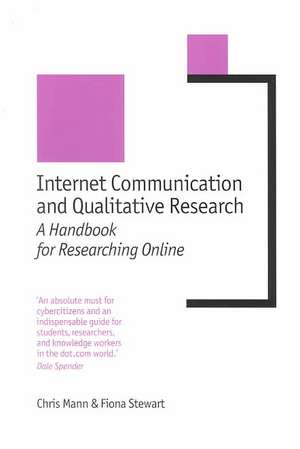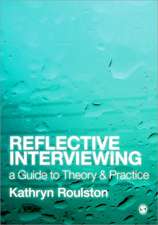Internet Communication and Qualitative Research: A Handbook for Researching Online: New Technologies for Social Research series
Autor Chris Mann, Fiona Stewarten Limba Engleză Paperback – 13 iun 2000
`The internet is exploding with possibilities for conducting social research. Mann and Stewart offer the first in-depth consideration of the prospects and potentials for doing qualitative research on-line. This wide ranging, clearly-written book is essential reading for researchers working at the cutting edge of qualitative methodology' - James A. Holstein, Marquette University
`This is e-scholarship. The book is a transformative project which brings the best skills of the old print scholarship to the cyberworld. The authors are no mere theoreticians - but hands-on net-users, who have made the imaginative leap to the dot.com world, and who have mapped the way for net research and researchers.
The authors are pioneers in the realm of digit-crit - opening the way with their critical evaluation of the digital media and net research. They profile the skills required by the online researcher and evaluate the context in which they are used - in relation to privacy, security, ethics and legal considerations. They also take up issues of power; they explore the social and political implications of the digital media, (with specific reference to gender) and the role of the online researcher.
An absolute must for cybercitizens and an indispensable guide for students, researchers, and knowledge workers in the dot.com world' - Dale Spender
`Mann and Stewart have prized open the mysteries of on-line qualitative research. For those new to this methodology the technology review demystifies; the social science research ethics issues are re-addressed with reference to the on-line situation; methods of conducting online focus groups and interviews, in particular, are detailed. The tone is both analytical and practical with a host of techniques suggested. I recommend this accessible text for all qualitative researchers, both academic and practitioner' - Rehan Ul-Haq, University of Birmingham Business School
`Here is the clear, useful guide to the Internet research needed by all of us interested in on-line relationships and research. The authors address such issues as ethics, confidentiality, the theory and practice of on-line research, and on-line power relationships (which will be of concern in distance learning plans and programs). A very valuable book.' - Cheris Kramarae, Center for the Study of Women in Society, University of Oregon
`Wonderful - "beyond the software" and into on-line interaction to aid and abet our qualitative research. This book shines the light. Mann and Stewart are to be congratulated in offering qualitative researchers effective and authentic ways forward through electronic communication. I'll use and recommend it!' - Gilly Salmon, Centre for Information and Innovation, Open University Business School
`Opens to view a whole new avenue for social research. Internet communication is the wave of the future. Mann and Stewart capture its potential with insight, caution, and consummate procedural skill. Pathbreaking in its area of research methodology! Students and researchers will be very pleased with its clarity and usefulness' - Jaber F Gubrium, Department of Sociology, University of Florida
`The authors have produced a timely and stimulating publication with handy explanations of Internet terms and qualitative research applications. This work should be made readily available not only for reference to academics and practitioners of marketing, but also to those with a lay interest in it' - Professor Len Tiu Wright, De Montfort University
Internet Communication and Qualitative Research is the first textbook to examine the impact of Internet technology on qualitative research methods.
Drawing on many pioneering studies using computer-mediated communication (CMC), the authors show how online researchers can employ Internet-based qualitative methods to collect rich, descriptive, contextually-situated data. They discuss the methodological, practical and theoretical considerations associated with such methods as: in-depth online interviewing, virtual focus groups, participant observation in virtual communities.
This is a comprehensive and practical guide that:
- reviews online research practice and basic Internet technology
- looks in detail at the skills required by the online researcher
- examines the ethical, confidentiality, security and legal issues involved in online research
- considers the theoretical challenges surrounding data collected in a 'virtual venue'
- addresses the social and cultural impact of researching online through a discussion of power, gender and identity issues in the virtual world.
Internet Communication and Qualitative Research will be an indispensable guide for all students and researchers working in the digital age.
| Toate formatele și edițiile | Preț | Express |
|---|---|---|
| Paperback (1) | 583.84 lei 6-8 săpt. | |
| SAGE Publications – 13 iun 2000 | 583.84 lei 6-8 săpt. | |
| Hardback (1) | 1379.67 lei 6-8 săpt. | |
| SAGE Publications – 13 iun 2000 | 1379.67 lei 6-8 săpt. |
Preț: 583.84 lei
Preț vechi: 686.87 lei
-15% Nou
Puncte Express: 876
Preț estimativ în valută:
111.71€ • 116.65$ • 92.25£
111.71€ • 116.65$ • 92.25£
Carte tipărită la comandă
Livrare economică 15-29 aprilie
Preluare comenzi: 021 569.72.76
Specificații
ISBN-13: 9780761966272
ISBN-10: 0761966277
Pagini: 272
Dimensiuni: 156 x 234 x 16 mm
Greutate: 0.41 kg
Ediția:First Edition
Editura: SAGE Publications
Colecția Sage Publications Ltd
Seria New Technologies for Social Research series
Locul publicării:London, United Kingdom
ISBN-10: 0761966277
Pagini: 272
Dimensiuni: 156 x 234 x 16 mm
Greutate: 0.41 kg
Ediția:First Edition
Editura: SAGE Publications
Colecția Sage Publications Ltd
Seria New Technologies for Social Research series
Locul publicării:London, United Kingdom
Recenzii
`Internet Communication and Qualitative Research is a trailblazing
introduction to data sources that will come to the fore in the new
millennium. Its cogent discussion of the techniques, ethics and methods of
analysis of Internet data should be read by every qualitative researcher' - David Silverman, Goldsmiths' College
`Mann and Stewart have prized open the mysteries of online qualitative research.
For those new to this methodology the technology review demystifies; the social
science research ethics issues are re-addressed with reference to the online
situation; methods of conducting online focus groups and interviews, in
particular, are detailed. The tone is both analytical and practical with a host
of techniques suggested. I recommend this accessible text for all qualitative
researchers, both academic and practitioner' - Rehan Ul-Haq, University of Birmingham Business School
"Opens to view a whole new avenue for social research. Internet communication is the wave of the future. Mann and Stewart capture its potential with insight, caution, and consummate procedural skill. Pathbreaking in its area of research methodology! Students and researchers will be very pleased with its clarity and usefulness."
"The internet is exploding with possibilities for conducting social research. Mann and Stewart offer the first in-depth consideration of the prospects and potentially for doing qualitative research on-line. This wide ranging, clearly-written book is essential reading for researchers working at the cutting edge of qualitative methodology."
millennium. Its cogent discussion of the techniques, ethics and methods of
analysis of Internet data should be read by every qualitative researcher' - David Silverman, Goldsmiths' College
`Mann and Stewart have prized open the mysteries of online qualitative research.
For those new to this methodology the technology review demystifies; the social
science research ethics issues are re-addressed with reference to the online
situation; methods of conducting online focus groups and interviews, in
particular, are detailed. The tone is both analytical and practical with a host
of techniques suggested. I recommend this accessible text for all qualitative
researchers, both academic and practitioner' - Rehan Ul-Haq, University of Birmingham Business School
"Opens to view a whole new avenue for social research. Internet communication is the wave of the future. Mann and Stewart capture its potential with insight, caution, and consummate procedural skill. Pathbreaking in its area of research methodology! Students and researchers will be very pleased with its clarity and usefulness."
"The internet is exploding with possibilities for conducting social research. Mann and Stewart offer the first in-depth consideration of the prospects and potentially for doing qualitative research on-line. This wide ranging, clearly-written book is essential reading for researchers working at the cutting edge of qualitative methodology."
Cuprins
Introduction
Practicalities of Using CMC
An Ethical Framework
Introducing Online Methods
Online Focus Groups
The Online Interviewer
Power Issues in Internet Research
Language Mode and Analysis
Virtuality and Data
Future Directions
Practicalities of Using CMC
An Ethical Framework
Introducing Online Methods
Online Focus Groups
The Online Interviewer
Power Issues in Internet Research
Language Mode and Analysis
Virtuality and Data
Future Directions
Descriere
Communication and Qualitative Research is the first textbook to examine the impact of Internet technology on qualitative research methods. Drawing on many pioneering studies using computer-mediated communication (CMC), the authors show how online researchers can employ Internet-based qualitative methods to collect rich, descriptive, contextually-situated data. They discuss the methodological, practical and theoretical considerations associated with such methods as in-depth online interviewing, virtual focus groups, and participant observation in virtual communities. This is a comprehensive and practical guide that:
- Reviews online research practice and basic Internet technology
- Looks in detail at the skills required by the online researcher
- Examines the ethical, confidentiality, security, and legal issues involved in online research
- Considers the theoretical challenges surrounding data collected in a "virtual venue"
- Addresses the social and cultural impact of researching online through a discussion of power, gender, and identity issues in the virtual world













